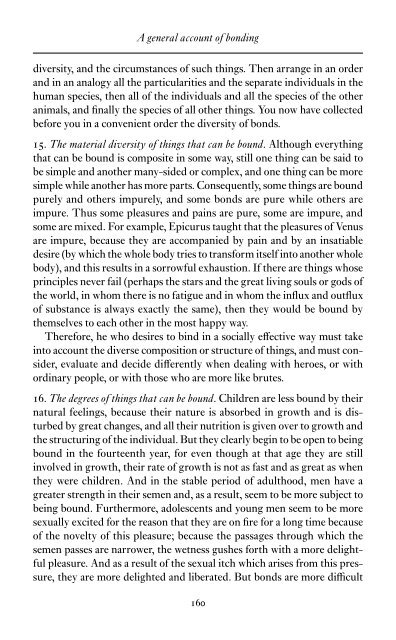Create successful ePaper yourself
Turn your PDF publications into a flip-book with our unique Google optimized e-Paper software.
A general account of bonding<br />
diversity, and the circumstances of such things. Then arrange in an order<br />
and in an analogy all the particularities and the separate individuals in the<br />
human species, then all of the individuals and all the species of the other<br />
animals, and finally the species of all other things. You now have collected<br />
before you in a convenient order the diversity of bonds.<br />
15. The material diversity of things that can be bound. Although everything<br />
that can be bound is composite in some way, still one thing can be said to<br />
be simple and another many-sided or complex, and one thing can be more<br />
simple while another has more parts. Consequently, some things are bound<br />
purely and others impurely, and some bonds are pure while others are<br />
impure. Thus some pleasures and pains are pure, some are impure, and<br />
some are mixed. For example, Epicurus taught that the pleasures of Venus<br />
are impure, because they are accompanied by pain and by an insatiable<br />
desire (by which the whole body tries to transform itself into another whole<br />
body), and this results in a sorrowful exhaustion. If there are things whose<br />
principles never fail (perhaps the stars and the great living souls or gods of<br />
the world, in whom there is no fatigue and in whom the influx and outflux<br />
of substance is always exactly the same), then they would be bound by<br />
themselves to each other in the most happy way.<br />
Therefore, he who desires to bind in a socially effective way must take<br />
into account the diverse composition or structure of things, and must consider,<br />
evaluate and decide differently when dealing with heroes, or with<br />
ordinary people, or with those who are more like brutes.<br />
16. The degrees of things that can be bound. Children are less bound by their<br />
natural feelings, because their nature is absorbed in growth and is disturbed<br />
by great changes, and all their nutrition is given over to growth and<br />
the structuring of the individual. But they clearly begin to be open to being<br />
bound in the fourteenth year, for even though at that age they are still<br />
involved in growth, their rate of growth is not as fast and as great as when<br />
they were children. And in the stable period of adulthood, men have a<br />
greater strength in their semen and, as a result, seem to be more subject to<br />
being bound. Furthermore, adolescents and young men seem to be more<br />
sexually excited for the reason that they are on fire for a long time because<br />
of the novelty of this pleasure; because the passages through which the<br />
semen passes are narrower, the wetness gushes forth with a more delightful<br />
pleasure. And as a result of the sexual itch which arises from this pressure,<br />
they are more delighted and liberated. But bonds are more difficult<br />
160

















